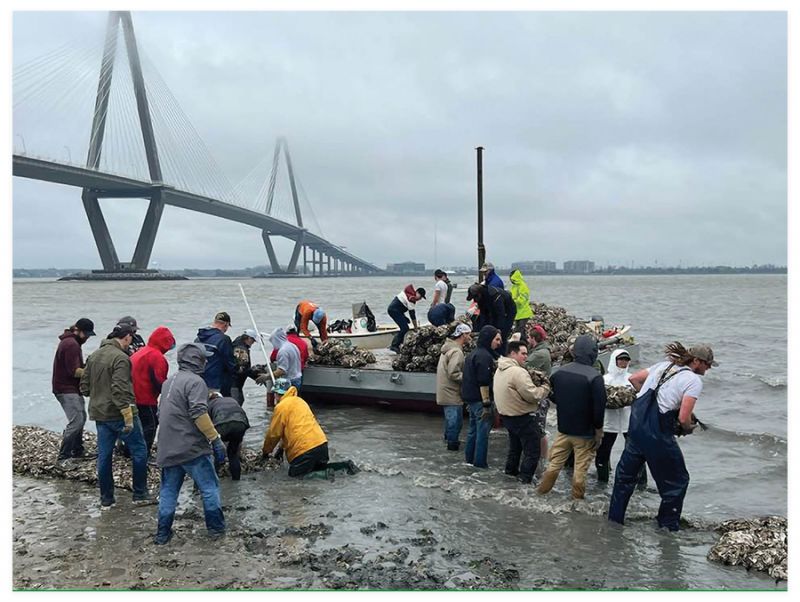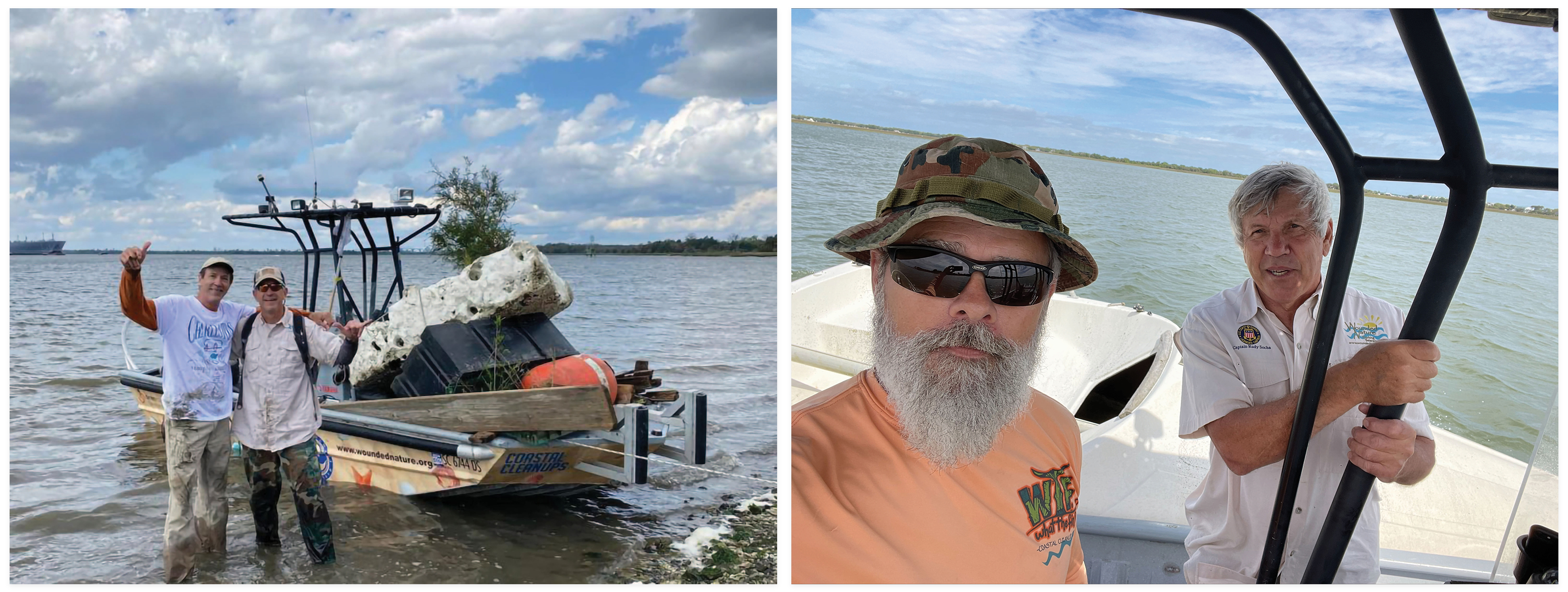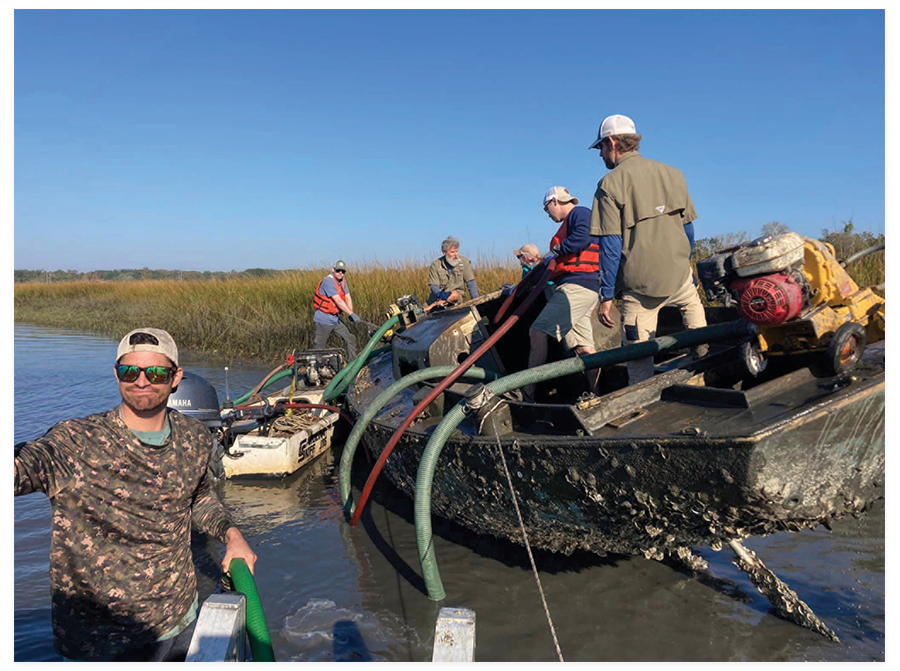Find out how you can aid the effort

In March, Wounded Nature-Working Veterans volunteers transported 650 bags of oyster shells for a renourishment project on Drum Island.
No one would ever order oysters with a side of petroleum sauce. But this summer a worrisome study detected fiberglass particles in shellfish collected from a harbor on England’s south coast. It’s exactly the sort of scenario that Wounded Nature-Working Veterans CEO Rudy Socha has been pushing to combat since 2010. “Plenty of people pick up tourist trash on public beaches where humans hang out, but the tidal marshes are most important to our wildlife populations,” he explains. To protect local fish, shrimp, and shellfish stocks, the 71-year-old waterman leads volunteers into hard-to-reach coastal corners to clean up large debris such as old tires, broken docks, and derelict boats.
Wounded Nature-Working Veterans—so named to signal that the nonprofit welcomes Department of Defense employees—hosts a large marsh cleanup every spring, as well as smaller cleanups throughout the year. Tour boat operators help teams reach shores accessible only by water so they can collect and haul away harmful litter and detritus. Volunteers brave muck, mosquitoes, gnats, and sharp oyster beds to remove nail-ridden boards, defunct tires, muddy plastic trash, and other unsightly and dangerous debris that lurk deep within the Lowcountry’s marsh grasses.

(Left) Brad Milano and Mike Olack removed debris from a tidal marsh earlier this year; (Right) Operations director and Army veteran Whit Jones with founder and CEO Rudy Socha, a former Marine.
While the nonprofit has become recognized for these cleanup efforts, it has begun zeroing in on derelict boats in particular. “Law enforcement works hard to keep the situation of abandoned boats under control, but they don’t have the budget to remove them and can’t take possession of them because of liability issues,” says Socha. “We fill that gap.” Partnering with various agencies, including the Charleston Police Harbor Patrol and Department of Natural Resources, the organization has overseen the safe removal of almost 200 deserted vessels.
After navigating the legal process to locate an owner or declare a boat abandoned, Socha and a crew of divers, barge owners, construction workers, and crane operators set to work. From floating sunken vessels using airbags to pulling submerged boats from the muck with amphibious excavators, each mission requires a specific plan of attack. (Membership in the Maritime Association of South Carolina connects the organization to people with the skills and heavy equipment necessary to get the job done.) “Once a boat’s been hauled, we remove the fuel tanks and motor, contain any sewage and other contaminants, break down the boat to be placed in a dumpster, and then dispose of everything in a landfill,” explains Socha, whose previous career involved project management for large corporations.
While the price tag for these efforts ranges from about $20,000 for recreational boats to hundreds of thousands for commercial vessels, it’s the environmental cost that has this CEO concerned. “A 30-foot boat contains 9,000 pounds of fiberglass, insulation, foam, and rubber that leach lead, petroleum, and other contaminants into the water as they break down,” he says.

Volunteers pumped water and patched hull holes before pulling an abandoned boat from the water in 2022.
“Right now, South Carolina is in a unique position to be the first state to remove all of the abandoned and derelict boats from its coast,” Socha continues. Wounded Nature-Working Veterans and SCDNR recently inventoried the remaining to-do list, which includes sailboats, barges, shrimp boats, and a steel-hulled WWII-era Navy ship. The goal is 90 projects and $5 million away.
Funding is the nonprofit’s greatest challenge, so Socha is appealing to businesses and the public. “Make a donation, throw a fundraising party, host a GoFundMe campaign, or sponsor the removal of a particular boat,” he suggests. “We have some of the most pristine marshes and beautiful beaches in the world. Let’s generate the money to finally get these boats out of our waters.”